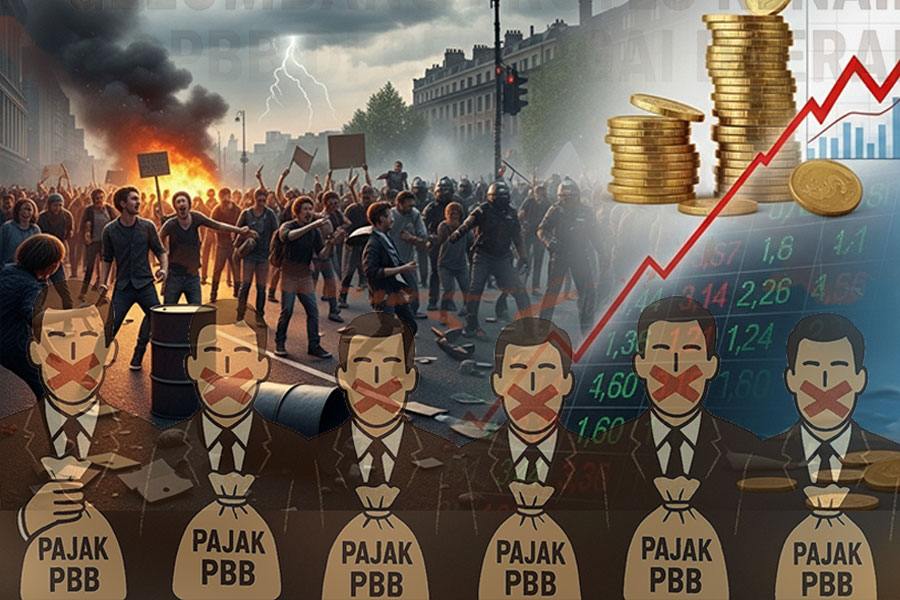Preventing Social Unrest Through Fair Tax Policy

In recent times, society has reacted strongly to the policy of increasing the Rural and Urban Land and Building Tax (PBB-P2) in several regions. Such protests naturally carry the potential to trigger social unrest.
In the context of early threat detection, we must be alert to the fact that burdensome tax policies can give rise to turmoil.
Efforts to increase local revenue (Pendapatan Asli Daerah) must not create new threats to stability.
This phenomenon is a reminder that taxation, which in public finance theory is considered the backbone of state life, is in fact a matter involving social sensitivity, the sense of justice, and the legitimacy of the state in the eyes of its citizens.
Thus, tax is not merely a number written in regulations, but a social contract binding the state and its people.
If perceived as unfair, it can lead to dissatisfaction and even the potential for social disintegration.
Tax, in this sense, is the concrete manifestation of the social contract: citizens willingly give up part of their wealth to the state with the belief that the state will use it for the common good, including development and shared welfare.
Yet this contract is fragile if one side fails to uphold it.
When people feel overly burdened, or perceive that tax revenues do not return as tangible benefits, that social contract cracks.
Small cracks can widen into a gulf that separates the state from its citizens. History itself testifies: in the United States, taxation became a trigger for upheaval.
The American Revolution in the 18th century, for instance, was born from the slogan “No taxation without representation” – a phrase that illustrates how unjust taxation can spark revolution.
Similarly, the Peasant Revolts in medieval Europe were fueled by the crushing weight of feudal taxes on the poor.
In Indonesia, tax tensions are not new.
During the colonial era, burdensome land taxes inflicted prolonged unrest on rural communities.
It is therefore understandable that today’s society remains sensitive to policies such as PBB-P2 hikes.
These are not just figures in a local budget table, but symbols of power relations that can trigger tension if perceived as unjust.
At the same time, the people also know that taxation is the lifeblood of the state.
Without taxes, it is impossible to finance infrastructure, education, health, defense, and other public services.
Thus, tax becomes an instrument of social justice distribution, where the state takes from those able to pay in order to finance the common interest.
Here lies the paradox of taxation: it is both a burden and a hope, a sacrifice and an investment.
The state is therefore required to act wisely so that the balance between burden and benefit is maintained.
When this balance is lost, taxation transforms from a tool of solidarity into a tool of oppression.
For this reason, fiscal justice must be the soul of every tax policy.
Take the PBB-P2 increase, for example: it will only be acceptable to the public if transparency and accountability are ensured, and if its benefits are clearly felt in the form of improved public services.
Without that, taxation will be regarded as coercion rather than voluntary contribution.
Contemporary philosophers like John Rawls emphasize the principle of justice as fairness.
In the context of taxation, fairness means that burdens must be borne proportionally to ability, and revenues must be used to improve the position of the most vulnerable groups.
If policies instead burden the poor while benefits remain invisible, then the principle of fairness is violated, and social resistance becomes inevitable.
From the perspective of national resilience, tax policies that are socially insensitive can also be read as potential threats.
In non-traditional security studies, threats are not only external military attacks but also internal social discontent that can erode national cohesion.
Tax increases that burden the poor are a form of “soft threat” that, if unmanaged, can undermine political stability.
The strong protests of recent days must be read not as mere temporary disturbances, but as early alarms warning of a trust gap between the people and the government.
Therefore, fiscal policy must be handled with political sensitivity, not only economic calculation.
In this sense, taxation in development is not just about revenue but also political education.
When people see their taxes used to build schools, hospitals, bridges, and other public services, collective awareness grows that they are part of a nation supporting each other.
But when taxes are instead perceived as a source of rent-seeking, corruption, or projects disconnected from basic needs, taxation loses its moral legitimacy.
In other words, taxation can become a symbol of solidarity or, conversely, a symbol of alienation—depending on how the state manages it.
For this reason, tax increases must be accompanied by comprehensive public outreach to prevent miscommunication that could spark tensions.
There must also be classification of taxpayers’ ability when setting rates, as an effort to preserve social justice and regional stability.
Furthermore, there must be firm and fair laws applied not only to taxpayers and evaders, but also to tax officials who commit corruption.
Only then will the burden be fair, and the benefits of taxation clearly visible.
Only in this way can taxation be seen once more as an instrument of national solidarity, not merely as a pressing obligation.
Rather, it becomes a national bond strengthening Indonesia in facing the challenges of the times.
Prof. Dr. Ermaya Suradinata, SH, MH, MS, was Governor of Indonesia’s National Resilience Institute (2001–2005) and Director General of Politics and Social Affairs, Ministry of Home Affairs (1998–2000). He is an Expert Council Member of BPIP (Agency for Pancasila Ideology Education) in the field of Geopolitics and Governance, and Chairman of the Advisory Board of the Center for Geopolitics & Geostrategy Studies Indonesia (CGSI).
